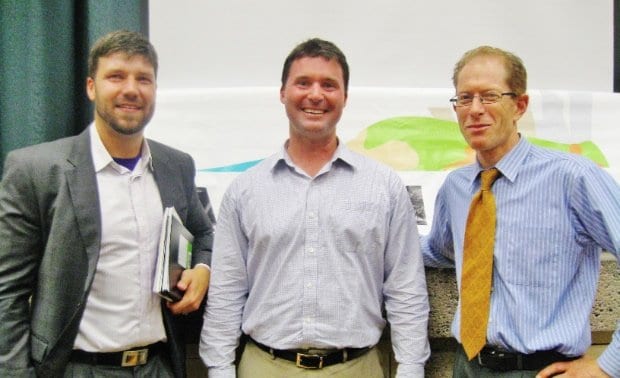Vancouver city planners received a chilly reception from West End residents when they presented a draft of their new West End Community Plan on Aug 28.
Approximately 250 residents, nearly all of them seniors, packed into the West End Community Centre to voice their frustration over what they describe as a flawed planning process and a poorly drafted plan.
Unaffordable rental housing, the construction of residential towers, higher density rates, traffic route concerns and questions regarding heritage building designations topped the residents’ list of concerns.
The event was hosted by West End Neighbours, an ad-hoc community group that opposes spot rezoning.
“We put on the event to gauge the temperature in the West End. There was strong and clear dissatisfaction with many aspects of the current draft community plan,” Randy Helten says.
“Our community needed an open public meeting specially focused on the community plan. This was the first chance for the public to communicate in a public meeting about the current state of the West End planning process,” Helten says.
“City staff were able to address and clarify some issues, but there is an underlying sense of frustration and concern about the process,” he continues. “A lot of issues have yet to be discussed and resolved . . . It was clear that we just scratched the surface.”
Three city planners faced a firestorm of questions and comments from approximately 30 speakers during the two-hour meeting.
“The city staff just had time to present a fraction of what the community is hungry to know. Even with a strict time limit of three minutes per speaker from the audience, we only got through a fraction of what people wanted to talk about,” Helten says.
During the meeting, many community members said they felt excluded from the planning process.
“We need to let the people who make the decisions know that if we are ignored, we’ll be here, standing up for our rights and defending our way of life,” one elderly resident said.
“I have a feeling that the plan being presented is more of a grab-bag of ideas that is being developed from different special-interest groups, and I’m quite concerned about that,” added another.
“The level of public confidence in this room toward this process and the city’s processes in general is very low,” said a Coal Harbour resident.
But the city says public input has been acknowledged and recorded in the plan.
“Community views have had a direct impact [on the plan’s development],” says Kevin McNaney, assistant director of planning for the city.
“We’ve heard that the neighbourhoods are extremely important and that we should protect their character, their green character, and we’ve done that. We’ve heard that there is a shortage of housing for families and rental housing, and we’ve looked at the laneways, which are the widest in the city, to provide rental housing. We’ve heard that community villages are extremely important, and we’ve implemented policy to protect and enhance those villages to make them stronger,” he said.
Since work began on the plan in January 2012, there have been 97 events, nearly two events weekly, city planners say.
Through those events, McNaney says, 6,900 people have given feedback on the plan — approximately 15 percent of the population in the West End.
“I feel like there was a lot done,” says Dara Parker, executive director of Qmunity, BC’s queer resource centre.
“I feel that the city has made a really strong effort to engage West End residents using both traditional and creative methods,” she says.
“I understand hesitation on the part of the community. Change is hard. But if we want investment and public benefit in the community — not just for Qmunity — change can’t happen without tools that allow for some kind of development,” she says.
The draft proposal recognizes the need for a new queer resource centre in the West End.
Parker says she’s “delighted” that the need for Qmunity space has been publically recognized in the proposed plan.
“We’ve been very involved with the planning process, and we wanted to ensure that our voice remained heard and that the LGBTQ voice was representing our communities.
“It’s critical for Qmunity to identify a new facility that’s accessible, that’s street level, that has kitchen amenities and that meets spatial requirements,” she adds.
A final community event is planned before the draft goes before council in September.
But some residents say the process should be extended.
“On Sept 24, city council will consider requests from the other neighbourhoods to extend their planning processes by at least six months and to improve the consultation processes. People should let the mayor and council know if they want this for the West End, too,” Helten says.
Helten says the community needs more detailed public meetings with city staff and complete mailouts with clear, concise information to all residents in the West End before any decision is made by council to adopt the plan.
“Drop-in open houses with comments going into a black box are not enough,” Helten says. “We need an objective way to measure public support for the final plan before it goes to council.”

 Why you can trust Xtra
Why you can trust Xtra


